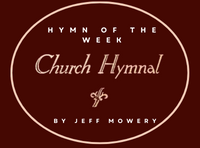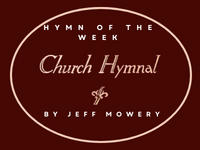My God I Thank Thee
My God, I thank Thee, who hast made
The earth so bright,
So full of splendor and of joy,
Beauty and light;
So many glorious things are here,
Noble and right.
I thank Thee, too, that Thou hast made
Joy to abound;
So many gentle thoughts and deeds
Circling us round,
That in the darkest spot of earth
Some love is found.
I thank Thee more that all our joy
Is touched with pain,
That shadows fall on brightest hours,
That thorns remain;
So that earth’s bliss may be our guide,
And not our chain.
For thou who knowest, Lord, how soon
Our weak heart clings,
Hast given us joys, tender and true,
Yet all with wings;
So that we see gleaming on high
Diviner things.
I thank Thee, Lord, that Thou hast kept
The best in store;
We have enough, yet not too much
To long for more:
A yearning for a deeper peace
Not known before.
I thank Thee, Lord, that here our souls
Though amply blessed,
Can never find, although they seek
A perfect rest;
Nor ever shall, until they lean
On Jesus’ breast.
Written by Adelaide Proctor in the 1800’s, but unfamiliar to me, I heard part of this hymn during a sermon by Alistair Begg recently. Ms. Proctor came from a fairly famous literary family in England. She died at the age of 39 after an extended period of time of sickness and struggle following a fall. The famous writer Charles Dickens, author of “A Christmas Carol” and “Great Expectations” had this particular quote about Ms. Proctor:
‘Now it was the visitation of the sick that had possession of her; now it was the sheltering of the homeless; now it was the elementary teaching of the densely ignorant; now it was the raising up of those who had wandered and got trodden underfoot; now it was the wider employment of her own sex in the general business of life; now it was all these things at once. Perfectly unselfish, swift to sympathize, and eager to relieve, she wrought at such designs with a flushed earnestness that disregarded season, weather, time of day or night, food, rest.’
Couple of comments on the lyrics:
- Verse 3 – I hope you will reread Verse 3 and think about the author’s statement. This particular verse is what I initially heard in the sermon, and what really drew me to this hymn. It is one of the most beautifully written stanzas that describes the reality of joy and pain in our life. How true is her statement that if this earth and this world were filled with constant joys and successes, we would never have a longing for another home. We would be so satisfied on earth that we would have no desire to go to Heaven. It would be, like the author writes, an earthly bliss that “chains” us to this world rather than a guide that reminds us that there is a better place prepared for us.
- “We have enough, but not too much” – This particular phrase reminds of the prayer in Proverbs regarding blessings. Proverbs 30:8-9 reads “Keep falsehood and lies far from me; give me neither poverty nor riches, but give me only my daily bread. Otherwise, I may have too much and disown you and say, ‘Who is the LORD?’ Or I may become poor and steal, and so dishonor the name of my God.” I love the fact that the author acknowledges a solid truth. We do have enough. From a human perspective sometimes, we may think we need more. But God has lovingly provided just enough, and that is definitely something to be thankful for.
- “Amply blessed” – I like the definition and synonyms for the word “amply.” They include “sufficiently, abundantly, richly and fully.” Isn’t that how God blesses? He gives us the sufficient grace we need at the time we need it. He gives us life and life more abundantly. He gives us fully – pressed down, shaken together and running over. He blesses, and blesses, and then blesses some more.
I hope all of you had a wonderful Thanksgiving time with your families. I hope you took a few moments to pause and be grateful for the things the Lord has done for you. Maybe you even practiced a family tradition of going around and having everyone tell what they are thankful for. I love doing this with children because sometimes their honesty comes right through, and everyone can share in a good chuckle.
I wonder, however, if you heard anyone thanking God for the things that the author of this hymn spoke of. Things like the “darkest spot on earth,” “pain,” “shadows,” “thorns,” and “yearnings.” Did you have anyone thanking the Lord for temptations, trials, tribulations, or “thorns in the flesh?” I will be honest. I didn’t hear many of those kind of Thanksgiving statements. But not to come across “holier than thou,” I personally wasn’t offering up that kind of thanksgiving either. However, this hymn reminded me of what Scripture teaches:
- “give thanks in all circumstances; for this is God’s will for you in Christ Jesus.” – I Thess. 5:18
- “Therefore I will boast all the more gladly about my weaknesses, so that Christ’s power may rest on me. That is why, for Christ’s sake, I delight in weaknesses, in insults, in hardships, in persecutions, in difficulties. For when I am weak, then I am strong. “ – 2 Cor. 12:9
- “Consider it pure joy, my brothers and sisters, whenever you face trials of many kinds, because you know that the testing of your faith produces perseverance. Let perseverance finish its work so that you may be mature and complete, not lacking anything.” James 1:2-3
I hope that the words of this hymn written almost 150 years ago will encourage you to truly say “My God, I thank Thee.”

